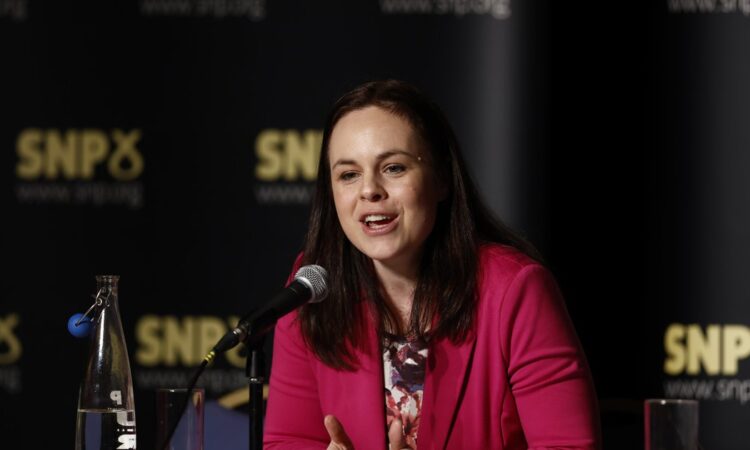
With little thought, the commission dismissed a Nordic-style economy. Rather than placing the transition to a sustainable economy at its centre, climate breakdown is an afterthought. Biodiversity goes unmentioned, as does childcare, which played a central role in the economic case for independence in 2014. “Flexible labour markets” on the other hand, get twelve mentions: so look forward to your zero-hours contract.
Its proposed currency plan was Sterlingisation: sticking with the pound even though the Treasury and Bank of England say they will refuse any of the formal arrangements of a currency union “for a possibly extended transition period”. While the commission’s other claims are ideologically right-wing – needlessly forcing the poorest to bear the brunt of any transaction costs of independence – and seem to have failed to engage with the past 20 years of lessons from the global economy, this is just downright batshit.
Scottish banks currently benefit from Bank of England liquidity facilities, helping guard against runs. If Scotland had its own currency and central bank or was part of a formalised currency union, then it would similarly be able to print money to ensure the system remained liquid. But without the capacity to do this, to acquire the sterling needed to stop the whole banking system from falling over, the Scottish government would need to either run a fiscal surplus, that is, tax more than it spent; somehow run a trade surplus without having the cash needed to invest; borrow on the international markets; or sell off state-owned assets in a privatisation fire-sell.
In a situation that would likely become increasingly unstable, lenders would demand increasingly high-interest rates, until the Scottish government was eventually forced to launch its own currency, not in the methodical way that would be possible were it floated on day one of independence, but in the firestorm of a full-blown economic crisis.
None of this is an inevitable consequence of independence: many countries have launched new independent currencies over the past 70 years or established or joined organised currency unions. Some small, impoverished states without major financial sectors have adopted another currency – usually the dollar – without any kind of agreement with its central bank. But no one has tried, as Forbes and all proposed, to run a country with a major financial sector using another country’s currency.
It may seem harsh to judge Forbes for all of the commission’s recommendations. She was just one of 14 members, and a brand new MSP to boot. But this report was published only five years ago and she defended it as recently as 2019. And she is the only member of the commission running to be first minister and leader of the independence movement.
Resetting the SNP
In the SNP leadership election, Forbes has been pushed by groups on the right. Early in the campaign, Chris Deerin of the centre-right think tank Reform Scotland wrote in the New Statesman that she was “the best candidate” to give the party a “reset”.
Interviewing her for the think tank days earlier, he described how “in a government that hasn’t always been seen as business-friendly… she’s impressed many in the business community”. And I’m sure those same people in her audience weren’t disappointed as she trotted out Tory-style creed after Tory-style creed, saying the government needs to let business “get on with it” and musing on how to attract businesses to Scotland through “tax incentives” and eliminating “regulatory burdens”.
Like a patronising Tory minister, she described the private sector as “the engine room” of the economy and the “wealth creator”, an idea whose simplicity is appealing but that collapses after closer examination. Take a hairdresser and a surgeon – both provide valuable services and you pay for them to take scissors to you: one from your pay packet, the other from your taxes. The idea that the barber is creating wealth because they are privately funded, while the medic destroys it because we pool our purchase of their skills together, is patently ridiculous. A more modern understanding accepts that the state, private and third sectors all create wealth, in conjunction.
Speaking to Deerin, Forbes was also careful to point out that the recent rises in income tax for the wealthiest happened when she was on maternity leave. She called for “radical” changes to the NHS and, while saying it must stay free at the point of use, didn’t rule anything else – including privatisation – out.
She said her “primary interest” in the education system is that young people should leave “able to participate in the workforce as effectively as possible”. For much of the SNP’s time in government, it has recognised the need to produce well-rounded citizens, with sex education and lessons about politics and current affairs as well as reading, writing and maths. Forbes appears to be hinting at a change of direction, swinging towards allowing education policy to be set by the demands of global capital. Asked about trials ‘freeing’ schools from the ‘burden’ of democratic accountability to local authorities – as Tories have done with academies and free schools in England – she made positive noises.
Deerin put to Forbes that the Scottish government’s targets for reaching net-zero carbon emissions are unrealistic and over-ambitious, and, while she didn’t adopt those words, she promised a “change in tone” towards big oil companies. Speaking to The Sunday Herald more recently, she went further, saying: “Any transition that happens too quickly will not only damage the Scottish economy in the short term, but also the long term.”
It’s hard to watch the event, or go through Forbes’ political history, without concluding that Deerin is right; as leader, Forbes would reset the SNP, transforming it into a party of the centre-right, with an economic agenda closer to Cameron and Osborne than Sturgeon and Swinney.



